Heather Shtuka's Blog
June 3, 2025
🌒 What They Don’t Tell You: When Your Child Goes Missing
There’s no manual for this.
No welcome packet. No emergency folder marked “In case your child vanishes.” No soft-spoken professional who gently guides you through what comes next.
What comes next, in fact, is chaos.
One moment, your world is intact. The next, your child is gone—and everything splinters.
You wait for someone—anyone—to step in with clarity, to take the lead. You assume there’s a process, a protocol, a chain of command. You assume someone is coming.
They’re not.
That’s the first thing they don’t tell you.
The second is this: you’ll be the one to lead the charge. You’ll become the engine that powers the search. You’ll make the calls, write the statements, coordinate the volunteers, press for media coverage, chase leads, hold meetings, raise funds, and manage hope. You’ll do it while drowning.
And your righteous anger—the kind that roars when systems fail and silence grows—will be labelled as distasteful. Too loud. Too sharp. Too much.
Grief is supposed to whisper, not scream.
But you’ll scream anyway, because the alternative is worse.
 The Unpredictability of It All
The Unpredictability of It AllThey don’t tell you that every case is different. That which works for one family might fall flat for another. That there’s no playbook to follow, no guaranteed path forward.
Law enforcement, search and rescue teams, and private investigators—they all bring different strategies. But success isn’t determined by process alone. Sometimes it’s timing. Geography. A tip. A chance encounter. A gut feeling. Or none of the above.
This isn’t math. It’s chaos. And you’re asked to navigate it blindfolded, hoping—praying—that what you try is the thing that works.
They don’t tell you that people will judge. Not just what you do, but how you do it. How you grieve. How you speak. Whether you’re doing too little or far too much. They’ll pass judgment on the person your child was—or wasn’t—based on fragments. On photos. On whispers. On what makes them comfortable.
They don’t tell you that your child’s worth in the eyes of the public will depend on the how—how they vanished, where they were, who they were with. That you’ll have to fight—every single day—to remind people that they mattered. Not because they’re missing, but because they lived.
They don’t tell you there’s no handbook. That you’ll be thrown into a storm with no map and expected to learn in moments what others spend careers perfecting. Search protocols. Media management. Trauma logistics. The learning curve isn’t steep—it’s vertical. And you climb it while your heart breaks.
 The Emotional Toll
The Emotional TollThey don’t tell you about the mental gymnastics required to survive. The way your brain runs in loops at 3 a.m., cycling through what-ifs and what-did-I-miss and what-now.
There is no rest. No pause button. You live in a state of suspended animation—trying to function, parent, work, breathe—while a piece of you remains locked in the moment they disappeared.
It’s not just grief. It’s terror. Prolonged and relentless.
They don’t tell you about ambiguous loss—a term that barely scratches the surface of this kind of grief. It’s the kind that lives in limbo. That keeps the porch light on even when your soul is begging for rest.
Whether you move mountains or fall to pieces, it changes nothing. There is no formula that brings your child home. No merit system. No fairness.
They don’t tell you that every missing person case is handled differently. That there’s no consistency in how loved ones are searched for, how long, or by whom. That you may receive dogs and helicopters, or nothing at all. That resources ebb and flow without explanation, and public interest fades faster than you can blink.
They don’t tell you that you will have to build and sustain accountability. That even when you’ve established a respectful relationship with the authorities, it can vanish overnight with a new staff sergeant. That you’ll travel hours for meetings, only to discover the file hasn’t been read. You’ll leave in tears—not from helplessness, but because this—the one thing you can’t do alone—is treated like a formality.
They don’t tell you that you’ll need to sweeten your pain. That every conversation with search and rescue or law enforcement is a dance—measured, cautious, polite. You’ll learn to temper expectations and sugar your words, because bitterness gets you nowhere, even when it’s deserved.
 The Role of Luck
The Role of LuckThey don’t tell you how much of this hinges on luck. Not love. Not effort. Not even resources. Just dumb, indifferent, maddening luck.
One child is spotted on a surveillance camera. Another vanishes without a trace. One community rallies. Another shrugs. One case goes viral. Another is quietly filed away.
There is no justice in that.
 The Injustice
The InjusticeThey don’t tell you that doing everything “right” doesn’t mean your child comes home.
You can raise awareness. Build coalitions. Speak to media. Post flyers. Organize searches. Work with authorities. Pray. Scream. Hope.
And it might still not be enough.
That’s the cruelty of it: there is no fairness here. No merit system. No guarantee.
They don’t tell you that life doesn’t pause. Your bills still arrive. Your family still needs you. And while your heart splits in two, you’ll be expected to keep showing up—for your partner, for your other children, for the friends who don’t know what to say anymore.
You’ll fight to let your surviving children live without your grief becoming theirs. They’ve lost, too. They shouldn’t have to carry yours.
They don’t tell you how dark it gets. How isolated. That no one gives you a timeline or a checklist. Those answers don’t come, and explanations, if they arrive at all, are often vague and inadequate. That you’re left stitching together the fragments of what might be, in the absence of what is.
And still. You rise. You speak. You remember. Because silence is a betrayal.
If you’re walking this path, I see you. I walk beside you.
February 21, 2025
The Gifts My Son Left Me: Finding Love and Strength After Loss
I have received many gifts throughout my life. Some wrapped in shiny paper and ribbon, some simple and unassuming, and others hand-delivered with the unmistakable clumsiness of tiny fingers eager to impress. Some gifts have been tokens of apology—because what marriage hasn’t needed a well-timed offering of flowers or chocolates? Others have been crafted with love, messy and imperfect, but made with the purest intentions.
Gifts come in many forms. Some are tangible, while others are more elusive: the gift of time, love, and presence. The ones we can hold onto and the ones we feel deep in our bones.
But the most profound gifts I’ve received are the lessons I never realized I needed.
Each year, we return to Sun Peaks—not just because it is where Ryan disappeared, but because it has become a place where we still feel close to him. His memory lingers in the snow-covered trees, the crisp air and the sound of laughter echoing off the slopes. It is not a place of mourning, though grief is ever present. It is a place of connection. A place where the community has embraced us lifted us and held us through our darkest days.
It is where I receive Ryan’s gifts again and again.
He has given me the ability to stand when I thought I would crumble. He has shown me the power of advocacy—of using my voice not just for him but for others who are still searching, still waiting, still hoping. He has gifted me reflection, the quiet understanding that love does not end, even when life does.
He has shown me the strength of community—in friendships that have never wavered, in the kindness of strangers who became family, and in the hands that have reached out, unasked, to steady me when I stumble.
Through Ryan, I have learned that grace exists in the most unexpected places. That love does not disappear—it transforms, grows, and finds new ways to exist.
I have learned to love more deeply, to forgive more freely, and to recognize how fragile and fleeting life truly is.
I am grateful for these gifts. But I would be lying if I said I wouldn’t trade them all to have him back. To hear his laugh fill the house. To see him walk through the front door, kicking off his shoes in the hallway, dropping his bag in the same spot he always did, and flopping onto the couch like he never left. To have just one more moment.
And yet, even in his absence, he is still in the love surrounding us. In the lessons he continues to teach me. In the quiet moments, shared stories and unwavering presence of those who remember.
And that is a gift I will carry for the rest of my days.
July 25, 2024
The Language of grief
“Grief is the price we pay for love, an unwelcome visitor that speaks a language we never wanted to learn but must. It teaches us the depth of our loss, the breadth of our love, and the resilience of the human spirit.” – Unknown.
Imagine having to learn another language. Some are born knowing this language, while others acquire it throughout their lives. Some will become fluent and well-acquainted, while others will only know a few phrases here and there. Yet, in the course of a lifetime, all will be introduced to it. This is the language of grief.
The Language of GriefGrief is considered the most complex and difficult language to learn. Even if you have lived in the same country for years or decades or studied it daily with great intent and immersed yourself in the phonics and delivery, you will never know the nuances, complexities, and ever-changing dialogue of grief entirely.
The language of grief is not one you choose to learn; it chooses you. It comes into your life uninvited, often without warning and demands your attention. You may find yourself stumbling over its harsh syllables, struggling to convey the depth of your sorrow or the weight of your loss. It is a deeply personal and universally experienced language, yet it defies complete understanding or mastery. But remember, you are not alone in this journey.
Intertwining with JoyGrief and joy are intertwined in the fabric of our lives. One cannot possibly visit the country of grief without acknowledging the neighbouring land of joy. Both are beautiful and necessary, yet they stand in stark contrast. Joy is often smooth and radiant, a journey filled with light and laughter. Grief, on the other hand, is rugged and raw, with a certain lawlessness that makes travelling here tricky.
Amid joy, grief can appear as an unwelcome shadow, a reminder of the fragility of happiness. Conversely, moments of joy can emerge unexpectedly within the depths of despair, offering brief reprieves and reminders of what has been lost. These two emotions, though seemingly opposites are intricately connected, each defining and giving depth to the other.
Navigating the Country of GriefWithin the country of grief, there are many provinces. Some people reside in the province of accidental tragedy, others in the city of violence, and still others in the village of illness. For some, the rural settlements of ambiguity are home, where the causes of their grief are uncertain or multifaceted Each group values and honours grief in decidedly different ways, with varying emotions. Wayfinding among these divisions is difficult, mired in anger, disbelief, or resigned acceptance. Despite these differences, some tendrils of familiarity weave through these factions. Yet, the language spoken in each province is different, shaped by its inhabitants’ unique experiences and losses.
For those navigating these lands, the journey is fraught with challenges. A phrase so familiar to one may inevitably offend another. Simple sentences have the ability to cut deep, as the nuances of grief are intensely personal. Understanding and empathy, more than anything else, become crucial tools in this journey, helping bridge the gaps between different experiences of loss. Your empathy can make a significant difference in someone’s journey through grief.
Provisions for the JourneySo, how do you travel to this distant shore of grief? What provisions must you make? The journey begins with empathy and a willingness to listen. It’s important to approach the language of grief with humility, acknowledging that you will never fully understand its complexities. To make your words universally understood and accepted, they must be offered with genuine compassion and an intent to comfort rather than to fix.
Communicating in the language of grief requires careful consideration. It’s about finding the right words at the right times, understanding when silence speaks louder than any phrase, and recognizing that sometimes just being present is enough. The goal is to offer support without imposing one’s own experiences or expectations, allowing those who grieve to navigate their own paths.
Welcoming OthersFor those living within the borders of grief, making others feel welcome can be challenging. It requires patience and an open heart to create a space where newcomers can feel unafraid to enter. This means being honest about your own experiences without overwhelming others and offering guidance without dictating how they should feel or behave. Your patience and openness can make a significant difference in someone’s journey through grief.
Allowances must be made for those unfamiliar with grief. They need room to learn, make mistakes, and find their own coping methods. Providing a supportive environment, those well-versed in grief can help others feel less isolated and more understood.
ConclusionGrief is a language we never wanted to learn, yet it is an integral part of our human experience. It teaches us about the depth of our love, the resilience of our spirit, and the universality of our emotions. As we journey through its rugged terrain, we discover that grief and joy are intertwined, each giving meaning to the other.
By navigating this complex language with empathy and understanding, we can support those around us and find comfort in the shared experience of loss. Ultimately, we come full circle, recognizing that the language of grief, while difficult and unwelcome, is also a testament to the profound connections we share with those we love.
May 29, 2024
Embracing the Paradox: Finding Balance Between Joy and Grief
Love never gives up.

May 14, 2023
The Art of Celebration
You do not need a festival to celebrate; life itself is a festival; celebrate your life.”
~Nitin Namdeo
Growing up, there wasn’t a lot of celebrations. Oh sure, there were the national holidays and one’s birthday, but never those defining moments that happen throughout life. Award ceremonies, track and field events, dance recitals or end-of-the-school-year celebrations were not observed. To be honest, I think most people didn’t celebrate the ordinary back then.
Maybe life felt hard, money tight, and a lack of guidance in how a family could function contributed to the feeling that only momentous occasions should be celebrated. But, on the other hand, maybe it felt like it was enough.
But.
Have you ever seen the look in a child’s eye as they scan the audience looking for their parents.? The delight and joy that radiates through their entire being when they see you in a crowd is breathtaking. 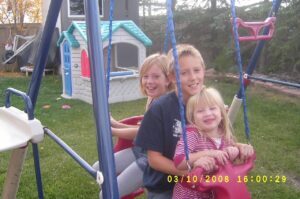
Or the appreciation your partner feels when a promotion is acknowledged and expressed with happiness.
We too often forget that these moments are the fabric of our lives, to be honoured and cherished because they will not last for some, and for others, they may not come in the same way again. Life is precious. Celebrations exist to capture all the wonder and joy of even the most mundane to help sustain us through the less perfect moments.
This weekend was a perfect example.
 Yesterday, Scott, Jordyn, Max, Judy and I attended a dance recital in honour of Ryan. It was a celebration of these amazing girls who worked hard all year on their craft. They put their heart into creating a beautiful tribute to our son. We were honoured by their dedication and humbled that they chose Ryan’s story to showcase their talent.
Yesterday, Scott, Jordyn, Max, Judy and I attended a dance recital in honour of Ryan. It was a celebration of these amazing girls who worked hard all year on their craft. They put their heart into creating a beautiful tribute to our son. We were honoured by their dedication and humbled that they chose Ryan’s story to showcase their talent.
Today is Mother’s Day, and although the day looks different with the girls all grown and without Ryan, I am thankful there are still reasons to be joyous.
For all of my children’s lives, we celebrated. We baked cakes for losing their first tooth. We played hooky from school to sit in near-empty theatres to watch movies. We had last-day-of-school dates filled with new books and giant ice cream cones. Neither Scott or I ever missed a field trip or school performance. We cheered on the sidelines of every soccer and ringette game.
We made moments.
Because if not now, then when? And if not for them, then who?
I am a mother because of my three children. But I am the person I am because of their love lessons.
So on this random second Sunday in May, take time to celebrate whatever the reason.
Because you can. Because you should.
February 21, 2023
Regrets – I’ve had a few
“Freedom lies in accepting our whole, imperfect selves and giving up the need for perfection” – Edith Eger, author of The Gift
I was given this book after Ryan went missing. I confess it took me many months before I could read it or even pick it up. Yet, it was as if my soul knew that salvation lay within its cover. I believed it was a journal filled with suffering when it was a handbook for survival.
Life is not linear. The essence of our being is constantly at war with what is right and what feels good. We struggle with our decisions and battle with a litany of ‘what ifs. If only our future choices were as clear as our hindsight visions, we would always know what lay ahead. Pain is inevitable, but suffering is optional. Instead, moments of clarity and understanding come out of the blue that defines who we are. Through epiphanies, we will be continually shown that forgiveness can be authentic and compassionate. Our ability to see things from a different perspective allows us to grow and change.
What I have learned is that regret and guilt are not synonymous.
How often have we looked at our past actions and felt this sense of shame and guilt? Guilt provides concrete reasons why we fail to be who we want to be, and the consequences can only be blamed on ourselves. Guilt is not related to any action at all but rather about feeling bad. It doesn’t require any changes to our thinking or behaviour. Guilt allows us to stay frozen in time, reliving our decisions with fear and loathing.
Regret, on the other hand, is the feeling of remorse. It’s based on the actual impact caused by our actions or inactions. Regret acknowledges the pain caused and demands restitution. It asks us to propel ourselves forward to change our behaviour and avoid repeating the same mistakes. Unfortunately, we are stuck with only guilt when we don’t allow ourselves to feel regret.
For the longest time, I have felt nothing but guilt. Guilt about how I parented my children growing up. Guilt about my inattentiveness or my tiredness. Guilt about my reactions to the most ordinary situations. Guilt about how I conducted myself when faced with challenges. I felt the constant heavy blanket of guilt. Somedays, it threatened to overwhelm me. But I couldn’t release it because the guilt felt like a fitful punishment that I should suffer. 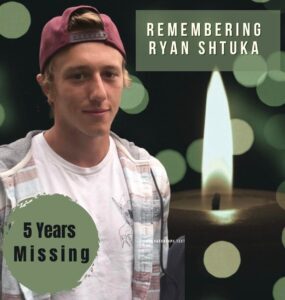
We often don’t realize the pain we have caused ourselves until we have time and space to think.
I now recognize that I have the ability to change the narrative. However, I cannot change the past. If that were possible, Ryan would be here safe. I would be a whole being devoid of guilt or regret because I wouldn’t have had to face my biggest fear or my greatest tragedy and find myself wanting. I can, however, stop judging myself for the person I was. I am that woman no longer. I am learning to recognize when a new version of myself emerges and to celebrate what a hard-won victory it is.
I regret so much, but I can embrace it because it means I can change. After all, I’m perfectly imperfect.
January 15, 2023
The spaces linger in those left behind
“All the art of living lies in a fine mingling of letting go and holding on.”~ Havelock Ellis
There is a vulnerability in sharing the deepest parts of you with those who have only been privy to the superficial until now. But here goes; I hate winter. I am not a fan of the blustery winds that seems to tear right through me, exposing my skin to their icy grip. I dread the darkening of the skies that come earlier and earlier until it feels like I wake up and live all day in perpetual gloom. The holidays bring a brief reprieve from wintery boredom, but January descends on me like an avalanche of snow, threatening to bury me until spring.
Most years, I escape the gloom and doom that January and February bring to visit my parents in warm and sunny Florida. They would disagree, however. The moment my feet touch their tropical soil, an “unseasonably cool” period begins. I won’t suggest that some (Nana and Papa) compare my arrival to a natural disaster, but I will say that heaters are readied just in case.
Upon reflection, maybe Winter doesn’t really get me either. Maybe Winter is confused by my inability to find joy in weather, encouraging snuggling in with hot port and slowing down for moments of solitude.
I am trying to change. I am working on embracing moments instead of wishing them away for better ones. After all, it is the time spent with others that provide a richness that is worth capturing and remembering. It is especially true for those that have left an absence where their presence once stood. 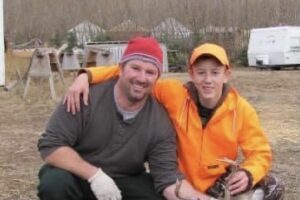
Ryan did not hate winter or the outdoors. He loved the crispness that the first winter breezes brought. He looked forward to the powderiness of snow that heralded the beginning of snowboarding. He enjoyed heading out with Scott and Darcy to spend the day ice fishing. Sitting in a tent, sipping coffee and telling tales of the one that got away was a favourite pastime.
For the last two years, I, along with Jubie and Nancy, have taken to spending time with the boys while they go out ice fishing. I won’t lie and say we are an excellent substitute for Ryan. I doubt very much that he made Scott put bait on his hook or put the fish back. He probably didn’t chatter as much, either. Scott, bless his heart, endures us with a good-natured grin. He even invites us back.
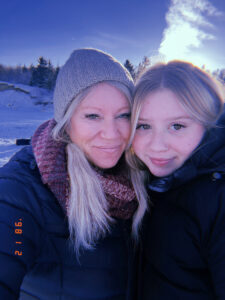
Through these moments, I recognize that we, as a family, have been doing this for the last five years. Slipping into spaces that Ryan once was. During hunting season, Julianna and Nancy accompany Scott out to the farm. They happily spend the day riding in the truck, eating cinnamon buns and listening to the boys swear up a storm. Not because it was their passion but because it was Ryan’s. A ritual with his dad, uncles and cousins.
Similarly, Scott has sat with me to binge-watch a series. Since he was a young kid, Ryan and I would cuddle on the couch faithfully watching ” The Walking Dead” or “Lost.” To my everlasting shame, we may have been partial years ago to “America’s Next Top Model.” It’s obvious now why Ryan was so invested in that one, but I loved the time spent with him. Even as he grew older and the distance on the sofa grew, we would still hang together and watch our favourite show. Now that is a role that Scott has taken on.
Reading that was once a passion of mine and Ryan’s is now extended to the whole family. Jordyn and I talk for hours about authors we love and books we recommend. Watching her, deeply captivated by a story, reminds me of my son.
All these spaces. Once taken in full by Ryan have now been parcelled into roles that we take on to help each other grieve his loss. Fused in our souls are memories that we hold onto. They are subtle but beautiful reminders that he is always with us. 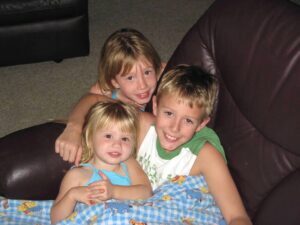
I may never be able to stop winter from coming but perhaps I can find grace in the season I am in.
December 31, 2022
New Year’s resolution or entrapment?
For me, there had always been something magical about December 31st, where the possibilities of recreating and realigning yourself exist. You go to bed one person, and the next morning you could begin a new year as someone else. Every year I had a chance to finally get it right.
All my life, I have been told that I’m too much. Too much talking, taking up too much space, too bossy, too argumentative, and too passionate. Was it meant to diminish me? Yes sometimes. Meant as a caution? Likely. And for most of my life, I listened. Heavy-hearted, I struggled to fit a vision that people could easily accept. Who doesn’t want to feel the warm embrace of acceptance and love? Even if it felt like a burden to change myself.

Of course, those feelings of inadequacy softened when I met Scott. I had a partner that didn’t judge me, didn’t ask that I be different and genuinely seemed to like who I was. Unconditional love is a primal need. The confidence that comes from knowing you are safe and protected gives you the courage to explore the world outside your home and hearth. The moment I laid eyes on each of my children, I knew this to be true. It would be our strengths and our challenges that would shape the world as they knew it until they could influence it themselves. Our children were the saplings from our seeds, destined to form their own deep roots.
Despite the clarity with my family, I still couldn’t shake the overwhelming desire to correct my flaws until my son’s disappearance. It is through life’s tragedies that the greatest epiphanies take shape.
“ Epiphanies are never convenient, and often arrive too late.” ~ Neal Shusterman
All those traits that everyone thought were too much suddenly became the tools I needed to find Ryan. All those perceived flaws were now opportunities. I embraced what I once shunned and sought to change. I did not break. I did not crumble. I grew strong, and I became fierce.

Now I wonder why I felt it necessary to constantly shape myself into this palatable, easily digestible version. An impossible task to be sure bound by the fickleness of others.
Like you, I am this beautiful masterpiece of complexities and ordinariness. I am not flawed but rather a work in progress. My canvas undergoes subtle changes that I, as the artist, am privileged to make.
Unlike previous years, this year, there will be no New Year’s resolutions to re-create or re-align. Instead, I want to take the best moments from all the years and add to them.
May this year be filled with more adventures, love, and the ability to grow exponentially more in spirit.
Happy 2023 everyone!
December 24, 2022
7 Ways to Go Easy on Yourself While Grieving at the Holidays
Out of all the holidays, Christmas is the one I love the most. It is the decorations in mid-November, the busyness of the stores as I typically put off my shopping until the last minute, and all the merry festivities that fill my heart with joy. But spending time with those I love most over the holidays is what I treasure the most. 
At the best of times, all the hustle and bustle can be incredibly stressful. Those feelings can be extra difficult when you are grieving the loss of a loved one. Feeling overwhelmed and struggling with a heightened sense of loss is normal. This article outlines 7 Ways to Go Easy on Yourself While Grieving at the Holidays.

No matter how you spend your holidays, you are not alone. Be gentle with yourself as you navigate a journey you were unprepared to travel.
To read this article by Eleanor Haley, click here
December 13, 2022
So I’m an author – now what??
I think of great authors like Hemingway or Austen, and I can imagine them toiling away, putting thought, word and deed to paper. I envision more modern and beloved authors of mine like Douglas Preston or Erin Morgenstern drafting copies of literary magic, sitting in airy sunlight rooms where the gentle crash of waves drifts in from the ocean below. It seems a dark contrast to my experience, huddled at my kitchen table in an uncomfortable hardback chair, trying desperately to concentrate as the sound of ‘Bob’s Burgers’ plays relentlessly in the background.
Hardly surprising that my road to becoming an author feels like a thousand miles away from what I imagined it would be. It is, after all, a story that I never wished to write and a story that should never have been read. It is a journey of unravelling pieces of who I was and becoming who I find myself now. Time will tell the value of this transformation, I suppose.
What an incredible paradox I find myself in. To take pride in the accomplishment of writing what has quickly become a bestselling book seems garish and unsettling. My tongue trips over thanking people for reading Ryan’s story with a clumsy “Enjoy.” But I am reminded that this book contains my son’s life, memories and love. Every word is meant to carry a legacy of a young man not here to create his own. It is an honour and a privilege to be the bearer of his story. I hope it, in some small way, resonates with the reader.
Perhaps the one consistency in all authors is the support and direction that lives behind the scenes. The machinations and inner workings that make every book possible. In that, I am no different. My husband gently encouraged me to sit and write. I will tell you a secret; he has yet to read what he helped to accomplish. It is a remembering that he finds difficult to relive. In time, I hope, he will. I also had the fortune of being surrounded by unicorns: bearers of light and hope. These women made the unlikely seem possible, and the promise of a manuscript blossom into a full-fledged published book. There are no words to express my gratitude.
No, this is not the path I imagined or a title that I wear comfortably, but it is a journey filled with love. And for me, that is enough.
Thank you for supporting Missing from Me.



